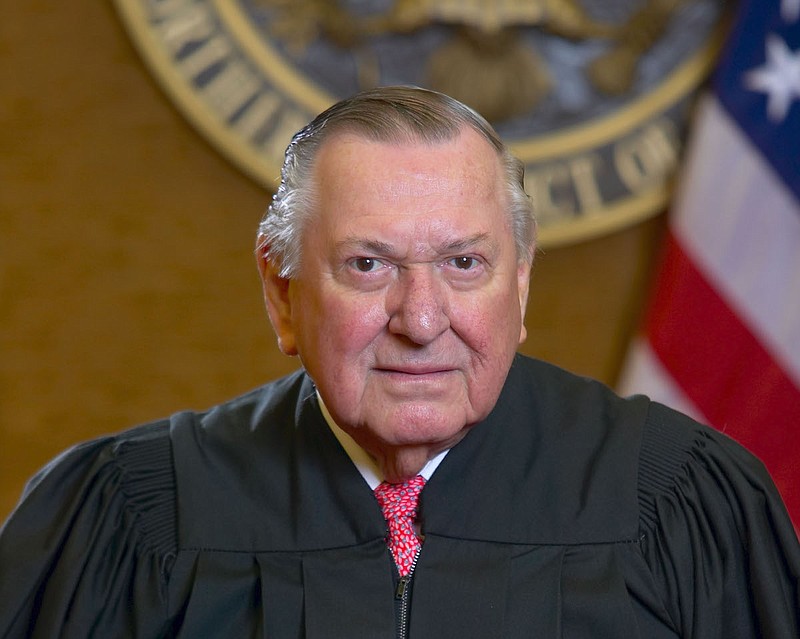The courthouse and federal building in Rome, Georgia, could soon bear the name of the late Judge Harold L. Murphy.
U.S. Rep. Marjorie Taylor Greene, R-Rome, has submitted legislation to name the facility after Murphy, who died Dec. 28 in Rome at the age of 95.
He served in World War II, in the Georgia House of Representatives and as a Superior Court and then federal judge -- carrying a full docket until the age of 90 and presiding over cases until his death.
Chief U.S. District Judge Timothy C. Batten Sr. said Murphy was an exceptional jurist, and that during Murphy's 45 years on the federal bench, he influenced legions of lawyers, law clerks, staff and litigants.
"He was one of a kind, and his intellect, professionalism, wit and compassion will be deeply missed by those of us lucky enough to have served with him," Batten said in a written statement.
Murphy served as a judge of the U.S. District Court for the Northern District of Georgia. The Northern District includes 46 counties covering all of North Georgia and the Atlanta metro area. The courthouse and federal building where he presided is at 600 First St. in Rome.
(READ MORE: Georgia courts, investigators say they're tackling backlogs)
Greene, speaking from the U.S. House floor in Washington, read a tribute to Murphy while proposing the legislation to name the courthouse and federal building after him. The next step for the legislation, H.R. 532, is under consideration by the House.
Greene, who represents Northwest Georgia, said Murphy had a keen sense of humor, was kind and empathetic and treated everyone who appeared in his courtroom with courtesy and respect. Above all else, she said, Murphy was a loving and devoted husband and father and role model who made everyone who knew him proud.
"The daily sight of Judge Murphy leading his gaggle of clerks to lunch on (Rome's) Broad Street will be deeply missed by the community in Rome that he loved so much, and that loved him back," Greene said.
Alabama State University named its graduate school after Murphy in 2014, Greene said.
Murphy earned that honor for presiding over Knight v. the State of Alabama, a landmark case that sought to rid the state of the last vestiges of segregation in the Alabama University System. The ruling and remedy presided over by Murphy helped integrate higher education in Alabama and provide better funding and programs at historically Black colleges and universities in the state.
In an open letter from 50 of Murphy's former law clerks, they remarked on the significance of that ruling.
"Who else but Judge Murphy -- a man who grew up in the segregated South -- could end one of the most contentious racial desegregation cases in the country with one of the publicly supported HBCUs in Alabama naming its graduate school for His Honor?" they wrote.
The law clerks said Murphy was the most valued mentor for many of them and also noted Murphy's sense of humor and reputation for fairness -- even from those he sentenced to prison.
(READ MORE: GA Supreme Court won't hear challenge to Georgia Power's coal ash plan)
According to his obituary, Murphy was born in 1927 in a small, rural community west of Atlanta called Felton. He attended West Georgia College before serving in the Navy toward the end of World War II.
After graduating from the University of Georgia School of Law in 1949, he practiced law briefly before being elected to the Georgia House in 1950 as its youngest member at the time.
After 11 years serving as an elected official and then a decade in private law practice, Murphy was appointed by then-Gov. Jimmy Carter to Georgia's Superior Court in 1971. After being elected to the nation's highest office, President Carter nominated Murphy to the U.S. District Court.
In a 2008 interview with a University of Georgia archivist, Murphy reflected on his life, notable cases and legal philosophy. In that interview, Murphy said he enjoyed being both a federal and state judge but missed practicing law. He said a lawyer who works for people rather than corporations can do a lot of good for people in need.
Murphy said a good judge needs a reasonable knowledge of the law and excellent knowledge of the rules of evidence.
"But more important than those two things, you need to respect every individual with whom you deal," Murphy said. "Whether that person is a lawyer or party to the litigation in a (civil) case or a defendant before you for sentencing. And be patient and be courteous; those are basic important requirements."
Murphy is survived by his wife of 64 years, Jacqueline Marie Murphy, his two sons and four grandchildren.
Contact Andrew Wilkins at awilkins@timesfreepress.com or 423-757-6659.
